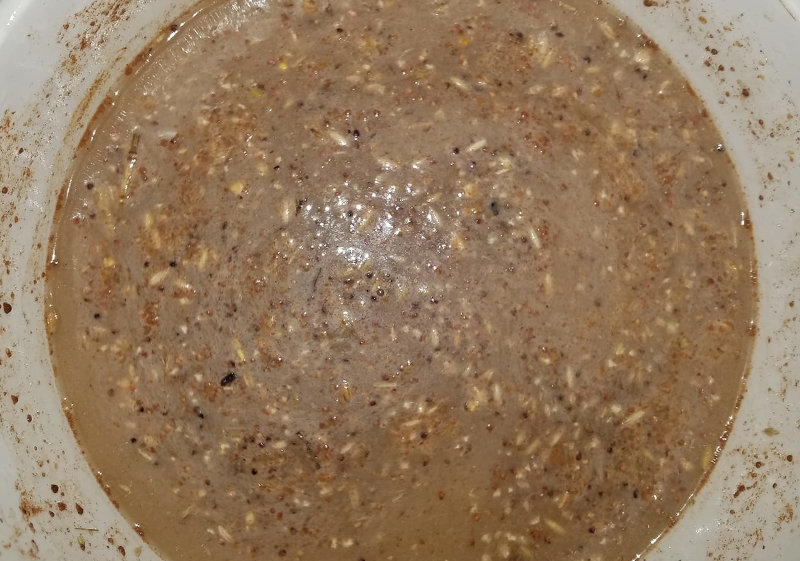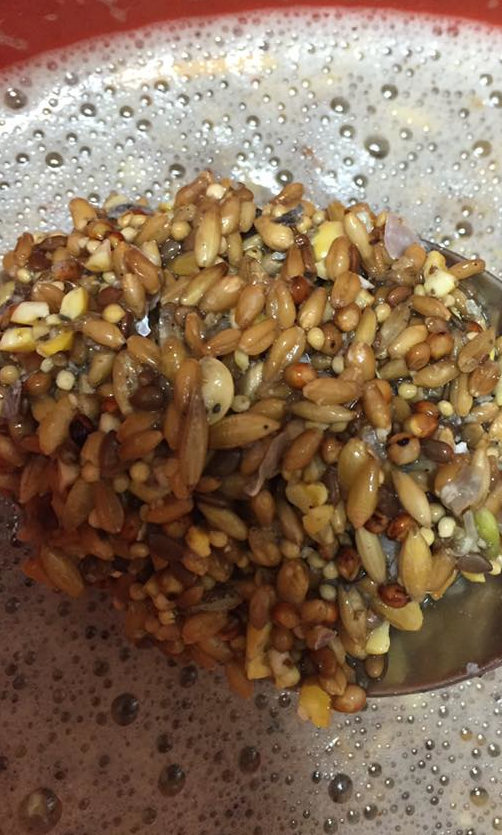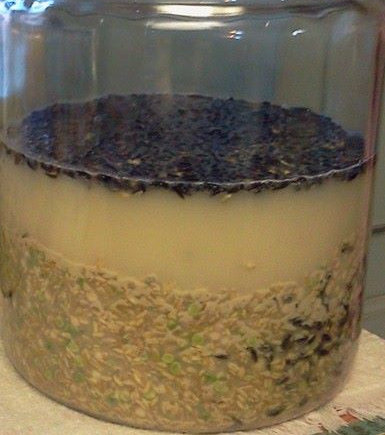Fermented chicken feed. Should you and is it worth it?

Do the befits of fermented feed outweigh the disadvantages, I tried to find out for myself in a purely objective way by looking at the science and trying it on my chickens.
Table of Contents
- If you want the TL;DR version, this is it:
- What is fermented feed for chickens?
- Do chickens like fermented feed?
- How much fermented feed per chicken?
- Reason to feed chickens with fermented feed:
- Reasons not to ferment feed for chickens:
- How to make fermented chicken feed:
- How do you know if your fermented chicken feed has gone wrong?
- What should you not ferment for chickens?
- What are the best foods or grains to ferment for chickens?
- Fermented chicken feed FAQ's:
If you want the TL;DR version, this is it:
- It was beneficial to feed wet fermented feed to day old chicks for the first 4 days of life.
- There is NO real world evidence to suggest that feeding chickens ONLY fermented feed is of any benefit in older birds.
- The sweet spot for benefit from fermented chickens feed is between 10% and 30% of total diet.
- The real benefit of fermenting chicken feed is that it reduces the sugar and starch content of the feed by converting it to lactic acid.
- Fermenting feed does not reduce your food bill, it would violate the first law of thermodynamics if it did. You cannot create energy by adding water and bacteria to feed. Lactobacillus use around 10% of the energy value of the food during fermentation.
- It does improve the digestibility of whole grains and lowers anti-nutrients in grains like barley and enables large food size particles to be more efficiently digested.
- Poorly nourished chickens may benefit but if birds have a good diet then fermented feed is unlikely to help.
- Feeding only soft food makes chickens more susceptible to crop problems.
- It makes no difference to the egg production or egg quality of healthy well fed chickens.
What is fermented feed for chickens?
Fermented chicken feed has been through the process of converting simple sugars and carbohydrates to organic acids using microorganisms, in this case a lactobacillus or lactic acid bacteria, under anaerobic conditions. Over the course of 2 to 3 days some sugars and starches are converted into lactic acid in the fermenting vessel. Fermented chicken feed has huger levels of some nutrients and is more digestible.
The science of fermentation is known as zymology. With chicken food almost anything that you normally feed to chickens can be fermented but it works better with whole grains.
Below: My egg flock getting some fermented whole wheat.
Fermentation has been used for hundreds of years by many cultures to preserve and enhance foods. If you have ever consumed cheese, yogurt, sourdough bread or sauerkraut you have eaten a fermented food.
Do chickens like fermented feed?
My chickens like fermented feed and so did the chickens in the studies we looked at. Once it comes into contact with oxygen in the air it has a detrimental effect on the quality of the feed and chickens will leave any not eaten after a few hours.
How much fermented feed per chicken?
The figures suggest that 30% of the diet of the diet fed as fermented feed is the most beneficial amount so giving your chickens between 1 and 2 ounces (25 to 50 grams) of fermented food a day will give your chickens all of the befits without any of the wastage or downsides of too much wet feed.
Below: I give mine what they can eat in a few minutes.
In all of the studies I have done on my own chickens and their eating habits over the years the one thing I have noticed they like the most is some variety in the diet.
Reason to feed chickens with fermented feed:
There are a couple of very good reasons to use fermented feed when feeding your chickens.
- One study showed that day old hatched chicks benefited from fermented feed as it prevented in some cases the colonisation of the digestive tract with salmonella. The first four days is crucial for the development of the gut microbiome in chicks and inoculating them with lactobacillus in fermented feed helped acidify the crop and gizzard and outcompeted the salmonella in the study.
- It may help chickens that are recovering or that have had antibiotics recently.
- Good lactobacillus can out compete bad bacteria in the gut.
- Fermentation can reduce the anti-nutrients in feeds like barley making them more useful for feeding chickens.
- Fermentation reduces the amount of sugars and simple starches in the feed.
- Fermenting chicken feed makes whole grains and large food particles more easily digestible.
- Fermenting chickens feed increases B vitamin levels.
Reasons not to ferment feed for chickens:
NOTE: Please bear in mind that some of the often quoted studies used as little as 10% fermented feed in the regimen and produced conflicting results. Some of them are funded by or overseen by researchers that have conflicts of interest with animal feed companies.
Also bear in mind the research subjects are mostly male leghorns rescued from the laying industry as they are free to obtain.
- Fermenting feed is time consuming, requires the purchase of equipment and the adoption of a routine and the opportunity for infection exists.
- If it saved money on the feed bill then commercial chicken and egg producers would have adopted it wholesale as they would not be missing out on a chance to save money. The studies broadly agree with the fermenting feed being around 10% more costly.
- The hens have beaten you too it. Chickens have a pair of pouch like organs called cecae attached to their digestive system that are especially adapted to fermenting food in the gut.
- It is detrimental for the early growth of chickens. In the 2013 study "Effect of fermented moist feed on performance, gut bacteria and gut histo-morphology in broilers" by J.A. Missotten, J. Michiels, N. Dierick,A. Ovyn,A. Akbarian &S. De Smet it was noted that "This trial showed that (FMF)Fermented Moist Feed was detrimental for early bird growth" even though it slightly improved feed efficiency in the long term.
- It can promote feather pecking and cannibalism. In the 2009 study into "Fermented feed for laying hens: effects on egg production, egg quality, plumage condition and composition and activity of the intestinal microflora" by Dr R.M. Engberg , M. Hammersh⊘j, N.F. Johansen, M.S. Abousekken, S. Steenfeldt and B.B. Jensen it was noted that:
"Fermented feed seemed to loose attractiveness for the birds quite rapidly, resulting in a more aggressive behaviour and a poorer plumage condition than in birds given dry feed."
and "The onset of lay occurred later when hens were fed on fermented feed" even though there was no statistical significance in the total egg mass production values in the study groups. Interestingly the birds came into lay later but produced bigger eggs initially. - Wet feeding does not allow the chickens to indulge in natural behaviour such as scratching on the ground and drinking from open sources of water. Forbes 2003 noted that the birds were hungry in the mornings, even though feed was left from the day before. Fermented chicken food moves through the gut very fast with wet feeding with an average passage time of only 3 hours. This could leave chickens that roost at 6pm with empty crops and digestive systems as early as 9pm at night.
- Wet feeding can lead to crop and other digestive issues. O.S.Akinola at al found in July 2015 when studying "Growth performance, apparent nutrient digestibility, intestinal morphology and carcass traits of broiler chickens fed dry, wet and fermented-wet feed" that birds fed with wet feed recorded higher levels of abdominal fat and reduced gizzard size.
- It leads to wet litter which can cause aspergillosis, hock burn and fungus growth.
- It can effect the nutrient and mineral balance of the feed. Both the protein and mineral balance differed in the fermented feed.
- It increased mortality. Below is the extract with this statement " Due to severe damage caused by cannibalism directed to the cloacal region, 5 hens of this group were killed for ethical reasons, resulting overall in a higher mortality rate of hens fed with fermented feed(4.2 vs. 0.4%)"
- Cold weather and winter can affect fermenting.
- Contamination of the ferment may allow the production of alcohol, mould growth or toxins. There is also a need to keep active cultures and exclude oxygen from the ferment.
- Fermented feed has a limited lifespan and can lead to wastage.
- Any claims that it will reduce your food bill or increase egg production with a very large pinch of salt, it didn’t in my tests and it didn’t in any of the studies I looked into. The reality of people evangelising about fermented feeds probably means they want you to buy their guide and purchase your equipment through their Amazon affiliate link.
How to make fermented chicken feed:
Fermenting chickens feed is an easy process but can be time consuming if the weather is cold. Here are the simple and easy steps to producing safe fermented feed for your flock:
Below: Successful batch or fermented mixed whole grains.

Easy to follow process for fermenting chicken feed:
- Use clean fermenting vessels with fitted lids, gasses need to escape while not allowing contamination. Plastic wine buckets work very well for this but the vessel you choose should be appropriate to the size of your flock. Fermentation products are slightly acidic so choose glass, ceramic, or BPA-free plastic. If you do not exclude oxygen from the ferment you may end up producing ethanol, which is very bad for chickens.
- Weight out the feed, use about half of what you give your birds on a daily basis. This will enable you to feed them 25% of their diet for two days from a batch which is the most beneficial amounts and will make sure their is never any wastage.
- Mix the feed with water. You need cover the starter with about 1 inch of water. If you are using grains they need to be soaked overnight first.
- Add a teaspoon of live yogurt to start the ferment. You can use wild lactobacillus and sourdough bread starter as well but starting with a culture is safer in the long run as the food is not cooked afterwards like a soda-bread would be.
- Stand at room temperature from two to four days and allow to ferment. You will begin to see small bubbles on the surface of the mixture and a characteristic sweet and sour smell will develop. Give a little stir or agitate the mix every day and add additional water if the liquid level drops below the surface of the solids.
- Drain the liquid off but keep it to start the next batch. Split the batch into two, feed one half of the grain or mash to your hens and refrigerate the other half for the next day.
You can feed any time after the ferment has started and it might be wise to introduce your chickens to some milder two day old ferment before going the full distance.
It will help them get used to dietary changes.
How do you know if your fermented chicken feed has gone wrong?
You can tell what's gone wrong with your fermented chicken feed by looking to see whether it has developed:
- It develops mould.
- Bad or off smell or putrid odours. Some describe as vomit smell
- Funky colours. Cloudiness is expected but odd or bright colours are a bad sign.
What should you not ferment for chickens?
You should not ferment the following for your chickens:
- Pelleted chicken feed. All the studies I looked at found that "The calcium and mineral content of the fermented feed showed considerable variation and was numerically lower than in the dry feed".
- Chick crumb should never be fermented. It will effect the dose of the medications in the feed.
- Sunflower seeds with the shell on, sometimes called black oil sunflower seeds wont ferment at all and flax seeds turn into a pulpy wet slimy mess.
- Never ferment medicated feed.
- Rice. Avoid all rice as it a source of Bacillus cereus which produces toxins that can be fatal to poultry.
- Lentils and beans. These need to be cooked properly otherwise they can kill chickens. Fermentation doesn't make them safe to eat.

What are the best foods or grains to ferment for chickens?
Grains are the best thing to ferment for chickens. If you are fermenting pelleted feed you will the affecting the balance of nutrients in the feedstuff. This was noted in severe of the studies I looked at.
I suggest that you start with scratch or whole grains like wheat, barley or oats and move onto other foods as you get better. Fermenting whole grains has the most benefit to chickens as pelleted feed is already nutritionally balance for laying hens.
The best grains to ferment for chickens are:
- Wheat.
- Oats.
- Barley.
- Corn (maize).
- Millet.
- Peas.
- Dari.
- Buckwheat.
- Safflower seeds.
You can also use mixed grains, either a store bought bag or your own recipe.
Fermented chicken feed FAQ's:
How long do you ferment chicken feed?
Two to four days. Feed will be fully fermented after 4 full days in the vessel as long as it's not too cold. You will know your batch of fermented chicken feed is ready when it takes on a strong, sweet and sour smell and the bubbles disappear. You can feed from day two if you want to.
How long does fermented chicken feed last?
You can keep fermented chicken feed for a maximum of 3 days if kept cool and air tight with oxygen excluded. Fermented feed older than 3 days will be too sour and acidic and the chickens will not eat it.
How often do you need to make fermented feed for chickens?
You will need to make a batch of fermented feed at least twice a week to be able to feed it four to six times during the week as the maximum time it will keep is three days.
Will fermented feed increase egg production in chickens?
No. None of the studies I looked at reported a greater number of eggs from chickens fed with fermented feed. The fermented feed group actually came into lay a bit later than normally fed hens but laid bigger eggs from the beginning of the laying cycle. The difference in the total egg mass was the same from both feed groups.
In my mixed flock of both hybrids and heritage breeds, feeding fermented chickens feed made no difference in the production rate of my 300 egg laying hens or to the shell quality or weight.
What should you use when fermenting chicken feed?
You will need clean, appropriately sized vessels to ferment and store the feed in. The containers you choose can be glass, ceramic or plastic and should have tight fitting lids as fermented chicken feed needs to be stored anaerobically, or without oxygen present.
Does vinegar prevent fermentation?
Adding any vinegar, even raw apple cider vinegar, will slow the growth of the lactic-acid bacteria resulting in off flavours and a decrease in the natural preservative qualities of lacto-fermentation products.
Can you make fermented feed for meat chickens or broilers?
Yes. Meat chickens will benefit from easily digestible foods. The amount is the same, between 10 and 30% of the diet.
Can you add molasses to fermenting chicken feed?
You can but I would not. Most molasses is preserved with sulphur which can give odd and eggy smells and may interfere with fermentation.
